Related Research Articles

Jefferson Airplane was an American rock band based in San Francisco, California, that became one of the pioneering bands of psychedelic rock. Formed in 1965, the group defined the San Francisco Sound and was the first from the Bay Area to achieve international commercial success. They were headliners at the Monterey Pop Festival (1967), Woodstock (1969), Altamont Free Concert (1969), and the first Isle of Wight Festival (1968) in England. Their 1967 break-out album Surrealistic Pillow ranks on the short list of the most significant recordings of the Summer of Love. Two songs from that album, "Somebody to Love" and "White Rabbit", are among Rolling Stone's "500 Greatest Songs of All Time".

Jefferson Starship is an American rock band from San Francisco, California that evolved out of the group Jefferson Airplane following the departure of bassist Jack Casady and guitarist Jorma Kaukonen. Between 1974 and 1984, they released eight gold or platinum selling studio albums, and had nine top 40 singles on the Billboard Hot 100 chart. The band went through several major changes in personnel and genres through the years while retaining the same Jefferson Starship name. The band name was retired in 1985, but it was picked up again in the early 1990s by a revival of the group led by Paul Kantner, which has continued following his death in 2016.
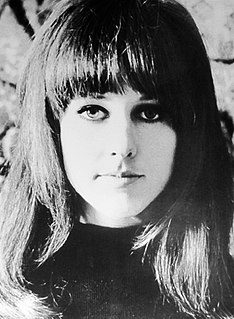
Grace Slick is a retired American singer-songwriter and artist who was a key figure in San Francisco's burgeoning psychedelic music scene in the mid-1960s. Her music career spanned four decades. She performed with The Great Society, Jefferson Airplane, Jefferson Starship and Starship. She also had a sporadic solo career. Slick provided vocals on a number of well-known songs, including "Somebody to Love", "White Rabbit", "We Built This City", and "Nothing's Gonna Stop Us Now".

John Henry Creach, better known as Papa John Creach, was an American blues violinist, who also played classical, jazz, R&B, pop and acid rock music. Early in his career, he performed as a journeyman musician with such luminaries as Louis Armstrong, Fats Waller, Stuff Smith, Charlie Christian, Big Joe Turner, T-Bone Walker, Nat King Cole and Roy Milton.

Wally Heider Studios was a recording studio in San Francisco, California between 1969 and 1980, started by recording engineer and studio owner Wally Heider.

Marty Balin was an American singer, songwriter, and musician best known as the founder and one of the lead singers and songwriters of Jefferson Airplane and Jefferson Starship.

Jorma Ludwik Kaukonen, Jr. is an American blues, folk, and rock guitarist. Kaukonen performed with Jefferson Airplane and still performs regularly on tour with Hot Tuna, which started as a side project with bassist Jack Casady, and as of early 2019 has continued for 50 years. Rolling Stone magazine ranked him #54 on its list of 100 Greatest Guitarists.

John William "Jack" Casady is an American bass guitarist, best known as a member of Jefferson Airplane and Hot Tuna. Jefferson Airplane became the first successful exponent of the San Francisco Sound. Their singles, including "Somebody to Love" and "White Rabbit", had a more polished style than their other material, and successfully charted in 1967 and 1968. Casady, along with the other members of Jefferson Airplane, was inducted into the Rock and Roll Hall of Fame in 1996.

Paul Lorin Kantner was an American rock musician. He is best known as the co-founder, rhythm guitarist, and occasional vocalist of Jefferson Airplane, a leading psychedelic rock band of the counterculture era. He continued these roles as a member of Jefferson Starship, Jefferson Airplane's successor band.

Starship is an American rock band. Initially a continuation of Jefferson Starship, it underwent a change in musical direction, the subsequent loss of personnel, and a lawsuit settlement that led to a name change. They had three number one singles on the Billboard Hot 100 chart in addition to two gold or platinum selling albums.

Red Octopus is the second album by Jefferson Starship, released on Grunt Records in 1975. Certified double platinum by RIAA in 1995, it is the best-selling album by any incarnation of Jefferson Airplane and its spin-off groups. The single "Miracles" was the highest-charting single any permutation of the band had until Starship's "We Built This City" a decade later, ultimately peaking at No. 3 on the Billboard singles chart; the album itself reached No. 1 four non-consecutive weeks during 1975 on the Billboard 200. As with several other albums from the epoch, stereo and quadraphonic mixes of Red Octopus were released concurrently.

Bark is the sixth studio album by American rock band Jefferson Airplane. Released in 1971 as Grunt FTR-1001, the album is one of the Airplane's late-period works, notable for the group's first personnel changes since 1966. The album was the first without band founder Marty Balin and the first with violinist Papa John Creach. Drummer Spencer Dryden had been replaced by Joey Covington in early 1970 after a lengthy transitional period in which both musicians had performed with the band.
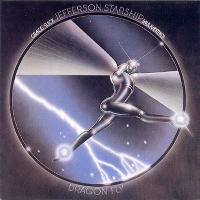
Dragon Fly is the debut album by Jefferson Starship, released on Grunt Records in 1974. It peaked at No. 11 on the Billboard 200, and has been certified a gold album. Credited to Grace Slick / Paul Kantner / Jefferson Starship, the band itself was a turning point after a series of four albums centering on the partnership of Kantner and Slick during the disintegration of Jefferson Airplane through the early 1970s.

Flight Log (1966–1976) is a compilation album by the American rock band Jefferson Airplane. Released in January 1977 as a double-LP as Grunt CYL2-1255, it is a compilation of Jefferson Airplane and Airplane-related tracks, including tracks by Jefferson Starship and Hot Tuna, as well as solo tracks by Paul Kantner, Grace Slick, and Jorma Kaukonen. Although primarily a compilation album, the album includes one previously unreleased song: "Please Come Back" written by Ron Nagle and performed by Jefferson Starship. "Please Come Back" is not available on any other release.
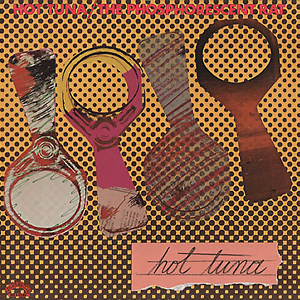
The Phosphorescent Rat is the fourth album by the blues rock group Hot Tuna, released in early 1974 as Grunt BFL1-0348. This was the first Hot Tuna album recorded after guitarist Jorma Kaukonen and bass player Jack Casady had left Jefferson Airplane. They were joined as before by drummer Sammy Piazza, though Papa John Creach had left the band for Jefferson Starship. The band's playing was moving away from the softer, more acoustic sound of their first three albums, and towards a hard rock sound that would be explored on their next three albums.

Joseph Edward Covington was an American drummer, best known for his involvements with Jefferson Airplane, Hot Tuna and Jefferson Starship.
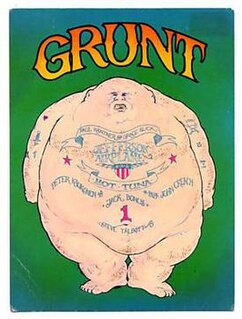
Grunt Records is a vanity label founded in 1971 by Jefferson Airplane and distributed by RCA Records. Initially created to sign local Bay Area acts, the label later was used only for Jefferson Starship and Hot Tuna releases. The label ended use in 1987 after Grace Slick left Starship.
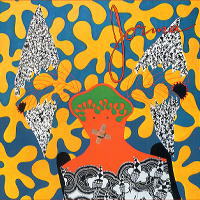
Jorma is the second solo album by Jorma Kaukonen of Hot Tuna and Jefferson Airplane. Hot Tuna had stopped touring in 1977 and Jack Casady had moved on to the band SVT. Bill Thompson and the staff that had managed Hot Tuna and still managed Jefferson Starship in 1979 continued to manage Kaukonen. David Kahne was hired to produce and the new solo album was released on RCA. The album consists entirely of Jorma's own vocals and his own electric and acoustic guitar work with many original songs written by Kaukonen. The last track is a poem recited by Kaukonen with no instrumental backing.
References
- 1 2 3 Gallucci, Michael. "Bill Thompson, Jefferson Airplane Manager, Dies at 70". ultimateclassicrock.com/. Archived from the original on 2 April 2015. Retrieved 2 April 2015.
- ↑ "Jefferson Airplane: The Official Website » Bill Thompson". www.jeffersonairplane.com/. Archived from the original on 19 February 2015. Retrieved 2 April 2015.
- 1 2 3 4 Tamarkin, Jeff. "Bill Thompson, Manager of Jefferson Airplane, Jefferson Starship and Hot Tuna, Dies at 70". www.relix.com/. Relix. Archived from the original on 3 April 2015. Retrieved 2 April 2015.